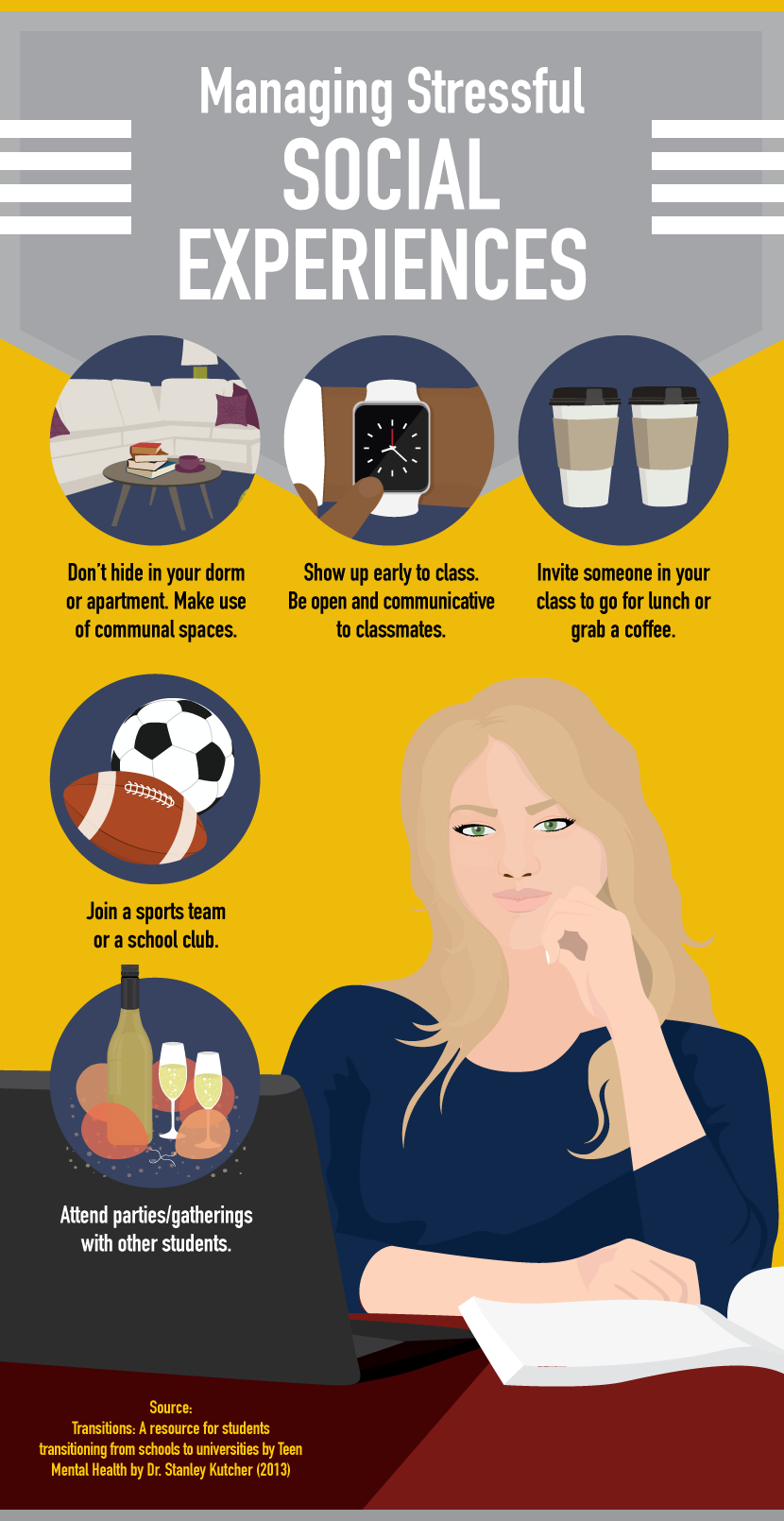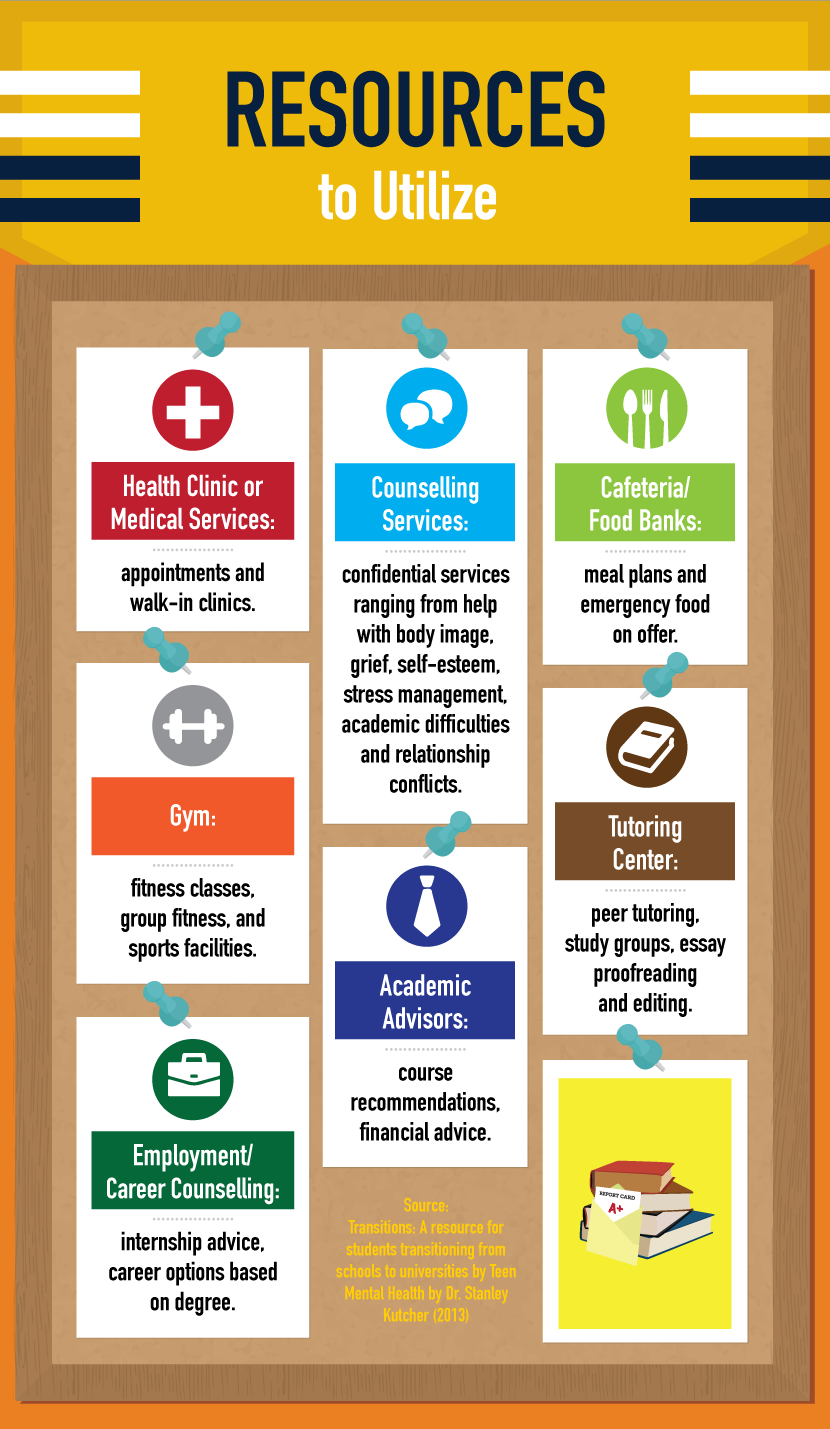Dealing With Stress at University or College
Attending university or college is a very exciting step in life. A lot of uncertainty and stress comes with it, however.
Students have to deal with studying for exams, finishing assignments on time, worrying about their future, and making new friends.
Trying to manage all of these goals can leave you feeling overwhelmed and can
lead to more severe mental health problems, such as depression, anxiety, and low self-confidence.
Fortunately, there are techniques and resources that can help stressed-out students cope with the issues they face.
Stress Related to Social Experiences
Departing from the safe haven of your parents’ home for the first time, meeting new people, and building friendships can be scary.
The good news is that many others attending university or college are in a similar situation! Here are some tips for making friends:
- Don’t hide out. If you are going to be studying or doing homework, consider doing it in a public area,
such as a student lounge or the library. You may also want to consider group studying options.
- Be communicative. Raise your hand and participate in classroom discussions.
By communicating in class, you become more approachable.
- Join a sports team or a club. This way you are able to meet people with the same interests as you.
- Invite someone in your class to go for coffee. Most classes allow coffee breaks,
so try asking someone in your class to grab a quick coffee and chat along the way.
- Be open. It’s important to know that at university and college you will be exposed to many different cultures,
religions, and beliefs. Be open and non-judgmental towards others.
- Show up early to class. Usually, at the beginning of class there are fewer people.
This will give you a chance to connect with others in a smaller group.
- Attend parties and gatherings. Most of the time, parties are where other students are meeting new people too.
They are a great way to chat with those who mix in other circles, as well as people you already know from class.

Stress Related to Workload
Studying is a major part of a successful university or college experience,
and learning the art of studying is necessary for good grades and a good future after university or college life.
Many students, however, are not educated in this art, and know neither how to study nor how to manage their time effectively.
Here are some tips to help you study better:
- Talk to your professor. Ask your professors about which areas you should be studying for.
Sometimes students feel that they cannot ask such questions, but most professors are open to helping in this way.
- Ensure there are no distractions. We can only concentrate on so much at once.
When studying new material it is important to reduce distractions as much as possible,
so that we retain as much information as we can. This means no TV, no cell phone, and no loud music.
- Join a study group. Studying with other people can help you understand difficult areas of your subject.
It can also motivate you and help you stay on track.
- Do more than just reading. Type or write out certain points; make a mnemonic for a certain definition to
help you remember it; or speak out loud while reading – this will help you retain the information.
- Take breaks. It is important to give your mind and body breaks during your studying period.
Go for a walk, talk to someone, check your email, or do some exercise. Take a break every fifteen minutes, but make these breaks short.
- Formulate questions on the topic you’re studying. Sometimes it helps to approach the study material this way –
it gives you an opportunity to think of examples and outline various answers.
Here are some time-management tips to help you stay on track and get those assignments done:
- Do not put off studying today. We all feel overwhelmed when we have to study a lot of material; however, it is important not to push studying or assignments aside. Instead, break tasks into smaller tasks and focus on progressing through each step.
- Do not rush. Sometimes we read through something quickly and think that we know it. However, this is not always the case.
Be sure to move on to the next bit of information only when you feel confident with what came before.
- Create a plan. Give yourself time to review all the material that you need to, and leave more time for difficult topics.
Create a schedule and break each segment into smaller segments so that you can accomplish small goals.
- Highlight. Scanning the material and highlighting the most important parts will help you understand key points.
This also helps when returning to study material – we can refer to the highlighted sections.
- Organize yourself. For example, put sticky notes on pages you want to work on the most,
or lay out material in your study environment so that you know what to work on next.

Stress Related to Self-Confidence
Whether because of low self-esteem, or too much self-criticism, many students fall short of caring for themselves
and do not give themselves enough credit for their accomplishments.
Just as studying and time management are necessary for a successful university or college life, so too is self-care.
When we do not care for ourselves, it is difficult to care about other things. Here are some ways to build your self-confidence:
- Practice self-care. Sleep well, eat healthy food, and exercise as much as you can.
Treat yourself and take care of your appearance. How you treat your body will have an impact on your learning.
- Remain positive. Sometimes you may get a bad grade, or get frustrated with a task.
It is important in these situations to remain positive about the broader picture.
Focus on something funny, something you love, or something that brings you joy when you feel down.
- Have fun. Be sure to get out and do things that are fun.
It’s important to have a balance of school and personal life.
- Silence your inner critic. We all have that negative voice in our head telling us negative things.
If you are thinking negatively or are worried a lot, change the way you think about yourself, about others, and about school.
- Give yourself credit. It’s important to recognize the great things that you do each day.
Give yourself a pat on the back for even the smallest achievements. This will keep you positive and motivated.

Formal Supports
Long-term stress can lead to decreased academic performance, depression, and physical health problems.
Some students may need extra, external support to help them with their stress management and self-confidence.
Of course, what is stressful for one student may not be stressful for another.
Similarly, some students may have a great coping toolbox, but others may not know how to help themselves in times of need.
It is important to seek external support if your stress levels are high and you are unable to cope.
Universities and colleges have on-site student counselors and mental health professionals whom you can speak to.
These professionals specialize in areas of workload management, coping with stress, and other student issues.
Students suffering from chronic stress often:
- Feel anxiety and/or depression
- Feel unable to manage things
- Are unable to think clearly
- Struggle or fail to complete tasks
- Lack concentration
There are also physical symptoms that are sometimes associated with chronic stress, such as:
- Stomach ache
- Sweating
- Back ache
- Frequent headaches
- Fatigue
Starting university can be a stressful experience. The important thing is to focus on how you are able to cope with this stress.
If you have strategies in place, they can enhance your academic performance, keep you happy,
and reduce health problems. Be sure to create your own coping “toolbox” with tips and strategies that help you.
Source: http://teenmentalhealth.org/product/transitions/
Embed the article on your site

